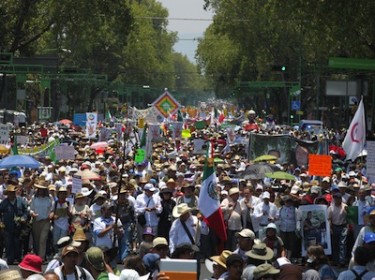This post is part of our special coverage Mexico's Drug War.
The silent caravan of the #marchanacional (national march) left Coajumulco early on Friday morning, May 6, to continue on its way to El Zócalo in downtown Mexico City.
Jesus Robles Maloof has been blogging about the march, and he updated his blog [es] with reports on the second day. He reminds readers that a lot of the people participating are parents, siblings and other family members that lost a loved one during these 4 years and are still waiting to receive justice:
Los rostros de Benjamín LeBaron y Luis Widmar, asesinados en Chihuahua, se podían observar en una enorme manta y ni que decir de los rostros sonrientes de Bety Cariño y Jiry Jaakkola, defensores de derechos humanos asesinados en San Juan Copala Oaxaca. En cierto sentido, quienes fueron abatidos marcharon con nosotros. Hablamos de sus vidas, escribimos sobre ellos. Los lloramos en ocasiones.

Thousands of Mexicans took part in the National March for peace and justice. Image by Luis Ramon Barron Tinajero, copyright Demotix (08/05/11).
At 14:19 the march entered Mexico City and protesters were recieved by the people of the town of Topilejo in Tlalpan on the southern part of the city, where they spent the night. Journalist Kristen Bricker wrote some reflexions about that day in her blog:
This march, more than anything, is a march against impunity. In some cases, police kidnapped and disappeared the victims. In another case, organized crime snatches little girls from a community and traffics them. In other cases, victims were killed in armed robberies. The perpetrators vary: organized crime, unorganized crime, or the government.
Twitter users were still very active the second day, showing support and distributing information. However, Twitter accounts sabotaging #marchanacional started spreading arguments against it, similar to the words used by the government: “Why isn't this protests aimed at the narco?”
Supporters of #marchanacional gave a simple answer: they don’t represent us. Twitter users quickly reported all of these accounts and at least one was suspended for spam.
After insisting that the government's actions are in the right direction, Felipe Calderón expressed respect for #marchanacional a day after [es]:
Es sensible a los ciudadanos y a su exigencia de tener un México sin violencia, por lo que las acciones de las fuerzas de seguridad están encaminadas a proteger a los ciudadanos y lograr el objetivo de tener un México de paz y justicia.
However reality shows that violence can be found everywhere in Mexico. On Friday the human rights organization NoDHo denounced [es] the attempted kidnap (levantón) of a woman that was on the Immigrant Caravan on the way to to join #marchanacional. Americas MexicoBlog reports:
A migrants’ caravan of 60 persons en route to join the March for Peace with Justice and Dignity was attacked by three armed assailants who tried unsuccessfully to kidnap a woman in the group. The attack took place at 1:30 this afternoon, near the border of the municipalities of Orizaba and Rio Blanco in the state of Veracruz.
Almeida noted the context of the attack on the migrants. “It's important to point out the loss of security; this is a zone that noone can travel safely through–not just migrants. It shows the level of institutional deterioration, because crime is there and it has been growing also because of institutional and governmental incpacity to stop it in the right places, beyond a general strategy of militarization.”
The Immigrant Caravan got to Puebla safely and joined the #marchanacional caravan in the National University in Mexico City on Saturday.
#marchanacional has also started getting more international attention; on Friday May 6, DJ Rupture wrote for Negrophonic:
Before we can begin to care about the impact of American drug consumption and U.S. drug policy on the tens of thousands of Mexicans dead, we have to feel… that Mexican problems are American problems.
Here is a video of the protest entering Mexico D.F and some footage of their stop in Topilejo:
This post is part of our special coverage Mexico's Drug War.








4 comments